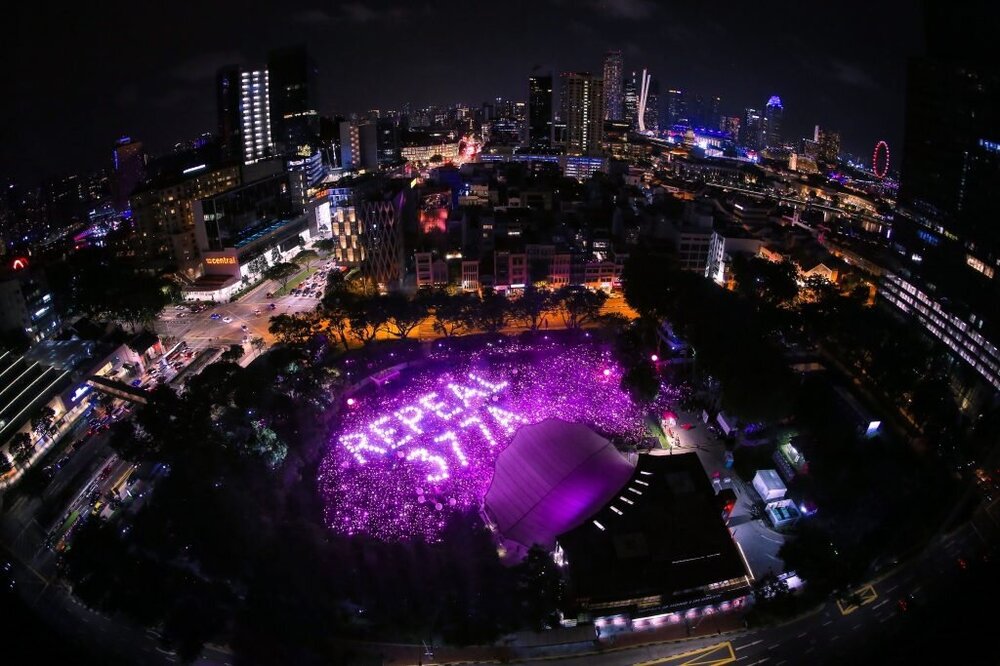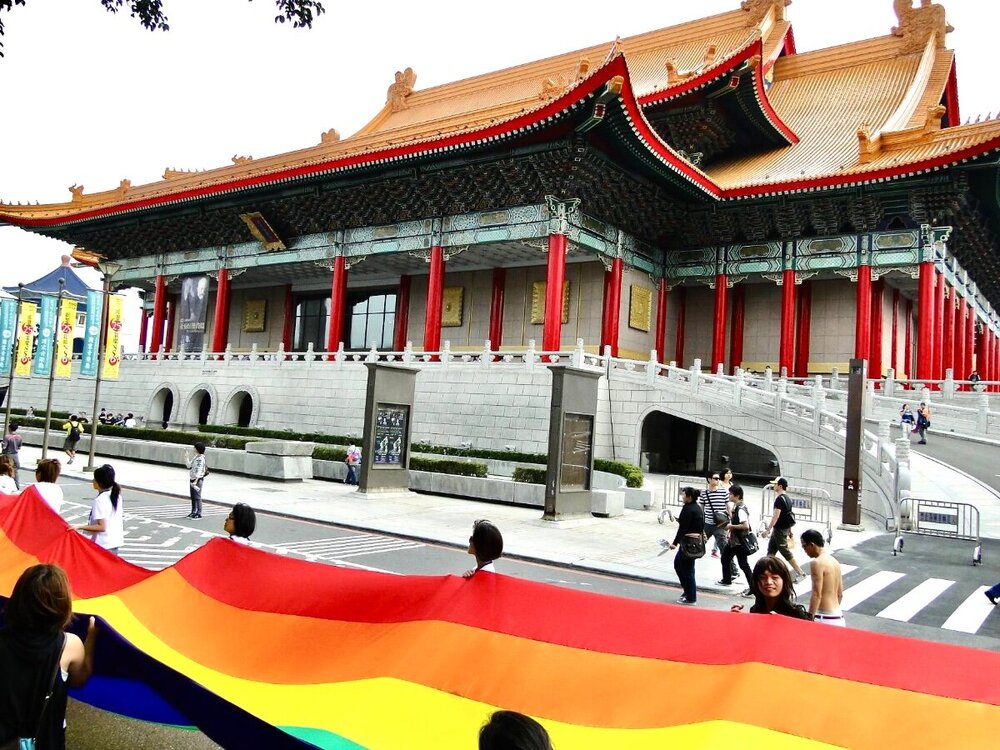
PeterRS
Members-
Posts
6,842 -
Joined
-
Last visited
-
Days Won
403
Content Type
Profiles
Forums
Events
Everything posted by PeterRS
-
BYGS used always to be pretty busy in the 90s and even into the 2000s. But I have noticed on visits thereafter that it is usually all but empty. When I llived there also in the 90s, I was never into the toilet scene. There was enough eye candy and nighttime entertainment in the small bars and discos nearby BYGS.
-
Gay Haters On The Move With Trump's Far Right Agenda
PeterRS replied to PeterRS's topic in The Beer Bar
And a few of the gay haters who are community leaders, actively promote family values or are preachers have in fact been caught in real closets with their pants down. -
The Ideal GoGo Bar. What Would Be Your Recipe For Success?
PeterRS replied to PeterRS's topic in Gay Thailand
They aren't! There used to be some advertising in the freebie magazines that were then common in gay venues, but these all died years ago. And that is sad because, not only is it much less easy to obtain information, but at least one was a real attempt to develop a gay interest. The one which used to be based in Chiang Mai had interesting articles. It even got an exclusive interview with Sir Ian McKellen. Now the venue owners assume all they have to do is open a bar and the crowds will magically appear. Fora like this one and a couple I know in Singapore and Japan help but depend on word of mouth. If one poster has a bad experience, others know about it pretty quickly. Then there is the reluctance of some bar owners to accept that the clientele they should be seeking is no longer randy westerners, many of a certain age. From what I read here almost none in Bangkok has moved with the times to adapt to a changing market. It ought now to be a much bigger market with far more coming from some Asian countries with different ideas of what a gogo bar should offer - and some others from further afield. But generally it seems to be same old, same old. I recall @Gaybutton saying in this forum well over 15 years ago that bar owners had forgotten a key element in running a gogo bar: its entertainment value. After all, bars are just as much in the entertainment business as cinemas and cabaret shows. -
60. I do go on other trips where sexual adventures are part of the agenda. For South America, the only reason was sightseeing. I had never been before, knew no-one and spoke hardly any Portuguese or Spanish. 9 cities/locations and 16 flights over a month (including 4 getting there and back) and each day was packed with activity. No time for anything else - except in Cuzco which was a complete although very pleasant surprise!
-
Merely out of curiosity, is sex an essential part of your travelling? I spent a fabulous month travelling around four South American countries and sex was rarely on my mind. It was a fabulous trip and I saw so many natural wonders. The only time sex came into view was on arrival in Cuzco in Peru. With the short 45 minute flight taking you from sea level to almost 3,500 meters up, everyone told me to do virtually nothing for the first 5 hours while the body acclimatized. For a while I lay on the bed reading, then got bored and hit a couple of apps. Ended up chatting to a delighful student who worked in a bar in the centre of the city in the evenings. He was keen to meet, so the next evening I went for a drink. He was lovely, was obviously well known to the other bar staff and so he came back to my room for a short time. Lovely little interlude!
-
Do. you mainly listen to the music of your youth?
PeterRS replied to unicorn's topic in The Beer Bar
I suspect this is true. For my own part my popular favourites have almost always been from those years and I have snapped up CD compilations whenever I come across them (I guess most people do still know what a CD is LOL). Occasionally I like more modern artists - Freddie Mercury and Queen, the Pet Shop Boys, The Village People and others at the start of the disco craze like Donna Summer. The one contemporary artiste I enoy and really admire is Taylor Swift. But with time on my hands, I'm with @Keithambrose. I'll also listen to Bach, Schumann, Wagner and a host of other classical composers as well as pianists and other top instrumentalists. -
The Ideal GoGo Bar. What Would Be Your Recipe For Success?
PeterRS replied to PeterRS's topic in Gay Thailand
We'll just have to disagree. I cannot see how the Thai government is likely to do more than encourage its own agencies - traffic management, police etc. - to cooperate with the organisers. Since, let's recall, prostitution remains illegal in this country, unless it changes the law the government cannot be seen to be co-operating with sex venues as some bright spark in the elite will certainly bring the media down on its collective head. Secondly, most of the gay sex venues here in Bangkok already do little to market their own product. Someone has to get the owners into one room, bash heads together and make them realise that co-operating on a huge event like this will be great business for everyone. This is vital because when Bangkok started its first Gay Pride Parade in 1999, it was basically up to each venue to do its own organising. It went off like a damp squib as it was badly organised and there was virtually no marketing (I know the main organiser did try to get TV stations and the media in general interested - they weren't!). Just talking about an event like this will achieve nothing. Everyone has to come to the party and contribute. Will they? No idea. But it certainly needs a small group of passionate advocates to take on the job of overall organising. As for the TAT marketing to the Pink Dollar, it has been doing this for years with slogan after slogan after slogan. Without the government actively backing it up, as with previous campaigns the TAT will have little success. I am reminded of a Songkran event on Silom about 10 years ago. Some young ladies/girls got up on the top of a truck and danced topless. They were arrested and accused of corrupting Thai morals. Then some bright spark made the point that the front page of the Ministry of Culture's website had a painting of four young Thai girls in front of some traditional background - all naked to the waist. That was quickly taken down! Let's also remember what happens in Singapore. Now it is arguably the most cosmopolitan city in Asia. It has finally got rid of its old colonial anti-sodomy law - but it still will not permit a Gay Pride Parade in the city! In 2009 a group of dedicated LGBTQ volunteers decided instead to have a gay event which they named Pink Dot. The government now restricts them to a small city centre park - thinking that this would limit international exposure - but the event just grew and grew. It became a family event. International sponsors flocked to sponsor the event. After all, Singapore encourages international companies to move to the city state with a number of concessions including tax benefits. But after Pink Dot became a big success, the government even barred international firms from participating in any way. Foreigners also are barred from the event. Then in 2019 the-then Prime Minister's nephew (great nephew of founding father Lee Kuan Yew) not only came out as gay but got married in South Africa and attended the Pink Dot that year with his partner. His father, the PM's brother, and his family also attended pink Dot that year. As bad for the government, one overhead night shot showed a sea of pink in the middle of the city skyline with the words "Repeal 337A". This was the old anti-sodomy law which was in fact repealed 2 years ago. (both photos courtesy of Singapore pink Dot) R to L: Younger brother of then Singapore PM Lee Hsien Loong with his gay son's partner, his gay son and other members of his family at the 2019 Pink Dot -
As regular readers will know, I have attended seven Taipei Gay Pride Parades since my first in 2011. I think they are fabulous week-ends, with lots of parties alongside the Parades themselves. At my last there were 160,000 marchers. I believe that is now more than 200,000. Many are dressed up in all sorts of gear. Others, like me, stick to a fun T-shirt and just enjoy watching all the others as I march. In response to a post in another thread about Bangkok hosting World Pride in 2030, I suggested I post a thread of some of my old photos. Apologies that most have been posted over the last 13 years but it's sometimes fun to remember what a blast that afternon can be and how many gorgeously cute guys there are, both Taiwanese and those flying in just for the parade week-ends. Do try and get over there this year if you can.
-
The Ideal GoGo Bar. What Would Be Your Recipe For Success?
PeterRS replied to PeterRS's topic in Gay Thailand
Yes, it will be good bye to a lot of what we know and what WE used to love. But for today's younger generation, they have no - or only a little - experience of what we used to love. Their experiences are different. What do THEY want and what will THEY love? I really do not know - and I think most of us do not know. Our gay world has changed massively in the 45 or so years since I first visited Bangkok. For the gay tourist or gay retiree everything is totally different with a whole new range of gay possibilities. Thanks to air fares in general being a great deal cheaper (as a percentage of one's income) than they were around 1980, there is a new gay world out there. Did I know anything about specific gay bars/areas in Bangkok before I first visited? Only from what I read in Spartacus magazine and heard from friends. But I had discovered Manila first. Then again, most of Bangkok's gay scene only began to develop after I started visiting. Let's also recall that the government had nothing to do with the establishment of Pattaya as a sex centre other than leasing U-tapao airport to the USA during the Vietnam War. Nothing at all! Pattaya was a sleepy little village then. It was the entrepreneurs who realised that the many US servicemen were young, sex-starved, wanted to have a bit of a wild time in their R&R breaks and girls were needed. So the private sector opened the bars, hired the girls and raked in masses of cash. It is no coincidence that R&R rapidly changed to become I&I - Intoxication and Intercourse! As for the World Pride in 2030, it will not need any help from the government. There will be plenty of private businesses thrilled to organise Pride parties. A bit like the annual Taipei Gay Pride Parades, of which I have attended seven. All the week-end parties and entertainment around the Parades are privately and amazingly organised - as are the Parades themselves. If you have never been, please try to do so. They are always on the last Saturday in October. Although I have posted lots of photos over the years, later today I'll open a new one under the Taipei section just to remind everyone what a great afternoon that Parade is. -
The Ideal GoGo Bar. What Would Be Your Recipe For Success?
PeterRS replied to PeterRS's topic in Gay Thailand
Sadly perhaps - zero. -
The Ideal GoGo Bar. What Would Be Your Recipe For Success?
PeterRS replied to PeterRS's topic in Gay Thailand
The problem is, in my view, that the numbers attracted by our gogo bar experiences in our youth no longer exist. There is no reason now for any younger gay guys to retire to Thailand other than it is a very pleasant gay-friendly place in which to spend one's final years. But the government of Thailand does not want retirees to be attracted by gay gogo bars etc. (although why they differentiate between gay and straight with all the girlie bars around beats me). The government is now desperate for a much different type of retiree, one that is generally considerably wealthier, will spend a good deal more cash and be more attracted by other things that Thailand can offer. As we know, the country needs cash. Why keep trying to attract older foreigners who live on a monthly income of around the official retirement Bt. 65,000 monthly when we know from the Thailand Privilege people that their new Bt. 900,000 just for a visa for 5-years is selling like hot cakes. The fact that most are Russians and Chinese is not yet an issue it seems. More important is that they are rich and they spend. I think it is no accident that although Bangkok is awash with 5-star hotels, the recently opened Bangkok One was billed as having yet five more - all 5-star! People who stay in 5-star hotels spend a lot of cash! To a certain extent I think we can draw a comparison with The Philippines (although I am not quite sure why!) In the 1960s and 70s, most tourists looking for gay sex in Asia looked to Manila. Bangkok and Thailand were on few horizons. Now gay sex in Manila is not a patch on what it used to be. The city has moved up market. -
I have earlier written a couple of long posts on the war in Laos but it certainly bears repeating. America's involvement in Vietnam really goes back to Roosevelt and then Truman. The corridors of power in America in those days had been massively anti-colonial, one reason why the US pushed Britain to get rid of its empire. That resulted in Britain bringing forward its exit from India by a year, a disaser which was to see a UK civil servant who had never been to India being tasked with partition of the country in only 5 weeks and the ghastly genocide of well over a million Hindus and Muslims as well as 14 million others being uprooted from their homes. As the leader of what became North Vietnam, Hồ Chi Minh wrote to both US Presidents all but begging them to ensure the French did not return to Indo-China. Whether they actually were presented with the letters is uncertain, but they certainly had no desire to see the return of the French to Asia. It was the French leader General De Gaulle who insisted, basically telling the US that if the French were not permitted to return, France would allow Soviet forces access to their territory. Having communist forces encamped in the other side of the Atlantic was anathema. For hatred of communism was quickly overtaking that dislike of Empire. Truman even provided covert support to the French after their return to Indo-China.. With Vietnam split into two in 1945, the French took over, little concerned at first with the North and the constant battles with Hồ's Việt Minh forces aided by the Russians. When China also became involved after the ignominious defeat of the French at Điện Biên Phủ, the US finally became alarmed. President Eisenhower had shown little concern about North Vietnam which he accepted was essentially a war of nationalism. Soon after becoming President, though, someone in his administration conjured up the "domino theory", one that Eisenhower quickly came to believe posed a serious threat - especially in South East Asia. Across the border, Laos also resented the return of the French. Whereas the country's government had largely been run by the upper classes, 90% of the country were peasants who had to pay high land rents and were overtaxed. Many joined the more popular Pathet Lao under the leadership of Prince Souphanouvong which had been formed in 1950 and quickly joined forces with Hồ's North Vietnamese Việt Minh. The French granted Laos independence in 1953, but retained control of all military matters. Meanwhile France was losing its grip and finally left Indo-China after its humiliating defeat in North Vietnam in 1954. Laos had previously been governed by a series of different ruling houses. Several came together under the Pathet Lao leadership. But that leadeship remained an amorphous group which virtually no one outside the country knew much about. All that was known was it was regarded, like North Vietnam, as communist as it was receiving help from the Soviets. Although its leadership generally came from the south of the country, the main bases of the Pathet Lao were crucially in the north and east - closer to Vietnam. Occasional fighting broke out between the Royal Lao Government in the south and the Pathet Lao in the north. But the big flare up occurred in 1963. The following year there were the Geneva Accords which split Vietnam into two. But Laos remained as one country. Even so, fighting continued to break out between the two main groups with the Pathet Lao gradually becoming the more dominant force. A crucial decision had been made by the USA earlier in 1954: it refused to sign the Geneva Accords. Privately US officials believed they were a disaster. It scrambled to establish a non-communist government in Saigon to counter Hồ's rule in Hanoi, providing it with substantial military and financial assistance. It was the belated start of what was to become a disaster for the USA - the Vietnam War. North Vietnam invaded North Laos, the territory mostly controlled by its ally the Pathet Lao in 1959. Another building block in the road to all out war in the region was now in place. The USA started its war in Laos that year. As he left office in 1961, Eisenhower told his National Security Council , "If Laos were lost, the whole of southeast Asia would follow." They key to US strategy at this point was therefore Laos rather than Vietnam. Virtually on the same day as that speech, he ordered the CIA into Laos to commence hostilities in the country, an incursion which, like Cambodia which was to follow more than a decade later, were totally illegal acts according to the US Constutition. The CIA's mission at first was to intercept and interrupt supplies of weapons being sent by North Vietnam to the Viet Cong in the South down the Hồ Chi Minh trail. At the same time the Pathet Lao was fighting the government in a civil war in the south of its own country. After President Kennedy came to Power, he tried to end hostilities in southeast Asia. A second Geneva Conference was called and all parties agreed to a peaceful solution. But that never happened. Within months the warring parties were at each other's throats again. The CIA then took on responsibility for ensuring the defeat of the communists. Again quite illegally, it assembled and trained a force of 36,000 troops mostly from the Meo tribe within Laos. This undeclared conflict became known as "The Secret War". During that war, the CIA constructed a new town at Long Tien to service what became known as the world's busiest airport, although air strip is a more accurate term. At one time, Long Tien was the second largest town in Laos with 40,000 inhabitants but it never appeared on any map. It was to be described as "the most secret place on earth." Long Tien was finally evacuated after the fall of Phnom Penh in Cambodia. During the Vietnam War, the CIA forced the North Vietnamese to redirect their soldiers through Laos to prevent them from attacking Americans. That way they could be bombed and killed. This was determined to be less risky than the earlier strategy of trying to cut off North Vietnamese forces on the Hồ Chi Minh trail. This policy was personally and again illegally approved by President Johnson. Largely as a result, as is now well known, Laos became the most bombed country in the history of warfare with one cluster bomb being dropped on that beleaguered country every eight minutes of every day for nine whole years. It is a disgrace almost without parallel in the history of recent warfare. In December 1975, the Pathet Lao took over the government of Laos and it remains its ruler to this day, although it is usually referred to as a term signifying Laotian nationalism.
-
The Ideal GoGo Bar. What Would Be Your Recipe For Success?
PeterRS replied to PeterRS's topic in Gay Thailand
I think that is an extremely sensible view. Even in the 'old days' (sorry to bring them up again!) I rarely hopped around. Once I found a bar I liked, I stuck with it - from Apollo, to Hotmale, to Barbiery, to Classsic, to Solid. Having a variety of bars added to the fun, but only for an occasional visit. On the other hand, though, I do think that Bangkok and Pattaya made their gay reputations on the basis of each having a significant cluster of gogo bars where nudity was more frequent and shows much more fun. This was what attracted many of the earlier tourists. And this I believe is the point made in @bkkmfj2648's earlier post. Without these clusters, are the Thai government and the Tourist Authority all but shooting themselves in their respective feet in terms of the future gay tourist market? I suspect not for, as others have pointed out, the gay sauna and massage spa businesses seem to be doing well. Whereas clusters of gogo bars used to be the main attraction for us much older folk, perhaps with just a few exceptions, the day of the true gogo bar is either over or coming to some sort of natural end, in Thailand as elsewhere. -
The Ideal GoGo Bar. What Would Be Your Recipe For Success?
PeterRS replied to PeterRS's topic in Gay Thailand
I fear those days ended many years ago now and I cannot think of any reason why they should return. But then I'm a glass half-empty kind of guy. I'm sure @vinapu will have a more positive outlook! -
There are certainly such bars around but you will be hard pressed to find any. There is a very large Thai underground sex scene but it is only for Thais. Exceptionally if you can find a Thai who knows where they are you might just be able to gain entrance. The nudity that was part of the gay Thai gogo bar scene for tourists existed from around the late 1970s until the government mandated a new social order campaign in the early 2000s. Thereafter virtually all the gay gogo bar scene eventually got rid of most of what had been regular nudity.
-
To go off on a bit of a tangent, one piece of marketing advice your bf may want - and another he definitely will not. First from the musical "Gypsy". And then of course if he runs out of ingredients, there is plenty of advice in Stephen Sondheim's musical "Sweeney Todd". This version was filmed at Sondheim's 80th brthday bash in 2010 and features the one-time Queen of Broadway Patti Lupone, the wonderful George Hearn and the equally fine Michael Cerveris. One beauty of this version is that Sondheim's genius as a lyricist is easily heard. Hearn was also the original and superb Albin in the Broadway production of "La Cage aux Folles" alongside Gene Barry in 1983. And it was in that show that Hearn magnificently originated what became the gay anthem "I Am What I Am."
-
Just realised that after decades in Asia, I have never tried duck's feet! Not that I want to, mind you. Chicken's feet are bad enough, but my Chinese friends all love them. Also never tried picking up ice cubes with chopsticks. I can understand the ice would be just too slippery. I'd probably just use a spoon!
-
Can I suggest that even though you have difficulty with chopsticks, sitting at the bar with all those cuties, they would notice your difficulty and you could ask one to help. I suspect more than one would have come over and become quite friendly. I am sure you have seen videos of how to use them. This one is quite useful - Once when I was in Beijing at a dinner with several guests not used to using chopsticks, I tried to show them how easy it can be and proceeded to show off by not only picking up one peanut but two. After three or four minutes, one of the others cut me down to size and outdid me by picking up three!
-
I hate to disagree with you because what you say is really quite obvious. But the fact is that the revenues contributing to Thailand's GDP from gay gogo bars must be the tiniest fraction of the tiniest fraction of 1%. After all, how many gay gogo bars are there? A few in Bangkok, a handful in Pattaya, a couple or so perhaps in Chiang Mai and the same in Phuket. Think back 30 years when the gogo bars were really in their heyday and not only the b-in-b but the economy as a whole did no doubt gain a lot more. I have zero doubt that the multitude of girlie bars all around the Kingdom actually generates vastly more to GDP. From reading threads in other forums, it seems that gay gogo bars around the world have been vanishing at quite a rapid rate. As one who revelled in the variety available in Thailand all those years ago, I wonder why this is. On the other hand I can understand why saunas and massage spas have retained - if not increased - their popularity. Perhaps we should not isolate gogo bars and think of the sex industry as a whole (and this means not just in-person sex but other aspects like Thailand's large underground movie industry). We know that behind the tourist facade there is a very large sex industry in Thailand. It's almost impossible to find figures but I have seen it claimed the industry as a whole amounted to US$60 billion in 2012. Let's assume for the sake of discussion that this grew to $80 billion in 2024. This compares with 2024's GDP of US$2.2 trillion. In other words (if my math is anywhere near correct) around 3.6% of GDP. Let's also look at Japan where we also know that the sex industry is all-pervasive, extremely well organised and caters almost exclusively to the local population rather than tourists. In an article last month Kyodo News estimated that Japan's total annual Defence spending in 2024 amounted to approx, US$70 billion or around 1.6% of GDP. 13 years ago the Japan Subculture Research Center estimated that the total spend on sex in Japan then to be US$100 billion. If we assume that this could have risen by as much as 50% (given the particular circumstances in Japan I am assuming the annual trend will be higher than in Thailand), then Japan spends more than twice as much on sex as it does on defense! And that perhaps rather surprisingly equates roughly to the Thailand percentage of GDP. Yet I have seen a figure somewhere that Japan actually spends 5% of GDP on the sex industries. So it is very important to stress again that accurate figures are extremely hard to find and estimates on various websites show major differences. My point being that taken as a whole, the potential revenues from gay gogo bars in Thailand (locals and tourists) is as small as a mosquito compared to the komodo dragon we think it might be! https://english.kyodonews.net/news/2025/04/2ddf9dea797c-urgent-japans-fy-2025-defense-related-costs-to-total-18-of-gdp-minister.html https://www.japansubculture.com/sexnomics-japans-billion-dollar-sex-industry-and-the-pink-zone/
-
Bumrungrad Hospital Offering 20% Off Colonoscopy Packages
PeterRS replied to PeterRS's topic in Gay Thailand
I had that joint procedure at BNH about 3 years ago. But please note that as with Bumrungrad, the total cost does not include the services of an anaesthetist should you wish one. -
Isn't the real problem that people no longer want to examine facts? It's so much easier just to believe what they are told - or what they have picked up from social media.
-
What about the pesky quarter and half satang coins that still turn up occasionally in change in Thailand. I have a drawer full of them! Mind you, when I was a kid I started collecting what used to be called "bun pennies" in the UK - the oldest penny coins issued with Queen Victoria's likeness on them still in circulation. I assumed that over time they would be worth something. Then, of course, I had no idea that coin collectors only want mint condition coins. So I now have 100 or so of those worthless well-used coins!
-
My sincere apologies to one and all. I am so used to posting almost daily on just one Photos thread, i had totallly forgotten that there are in fact many of them. All that @bkkmfj2648 did was take my actual advice which i had not realised would mean one separate photo thread. Big istake on my part and again apologies. Sorry also to @spoon for wasting your time! I have asked the moderator to take down the nude photo i posted earlier.





















